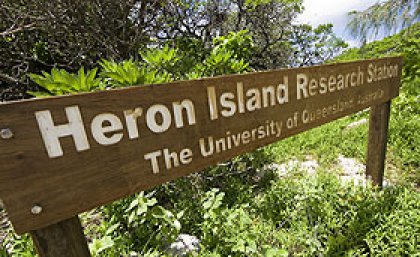
Less than three weeks after UQ's Heron Island Research Station reopened, staff have been forced to evacuate due to the threat of Cyclone Hamish.
Station staff were safely evacuated by ferry on Saturday afternoon.
Deputy Director of UQ's Centre for Marine Studies, David Clyde, said Monday saw wind gusts of up to 100km/h strip trees of leaves and several were blown down over the recently landscaped station.
"The tidal surge caused by Hamish combined with an exceptional four-metre high tide had water lapping over the helicopter pad and across the road in front of the station boatshed," he said.
"We are advised that, at this stage, the threat to Heron Island has eased but could reintensify if the cyclone changes direction."
Station staff member Collette Bagnato said Heron Island's wildlife was struggling to survive.
"The winds on Heron Island are so strong that its resident Noddy birds are being blown backwards into the sea," Ms Bagnato said.
Ms Bagnato saw some turtle hatchlings emerge out of the sand and onto the jetty, only to be blown into the sea by the strong winds.
"Many turtle nests were inundated with water and the eggs have probably drowned while other unhatched eggs were washed into the sea," she said.
The emergency evacuation comes less than three weeks after the station reopened following a $9 million reconstruction.
The refurbishments came after a fire destroyed most of the station in March 2007.
Located at the southern end of the Great Barrier Reef National Park, Heron Island Research Station is the largest and most sophisticated marine research station in Australia, providing research laboratories within metres of Heron Reef.
It was established more than 50 years ago and is a cornerstone of the Australian Research Council's Centre of Excellence in Coral Reef Studies.
It is recognised as one of the key facilities for research as well as undergraduate teaching and training. Many high schools also come to Heron Island to teach their students about coral reef ecosystems.
Media: Penny Robinson at UQ Communications (07 3365 9723) or Rob Mackay-Wood at the Centre for Marine Studies (07 3346 9041)
.jpg)



